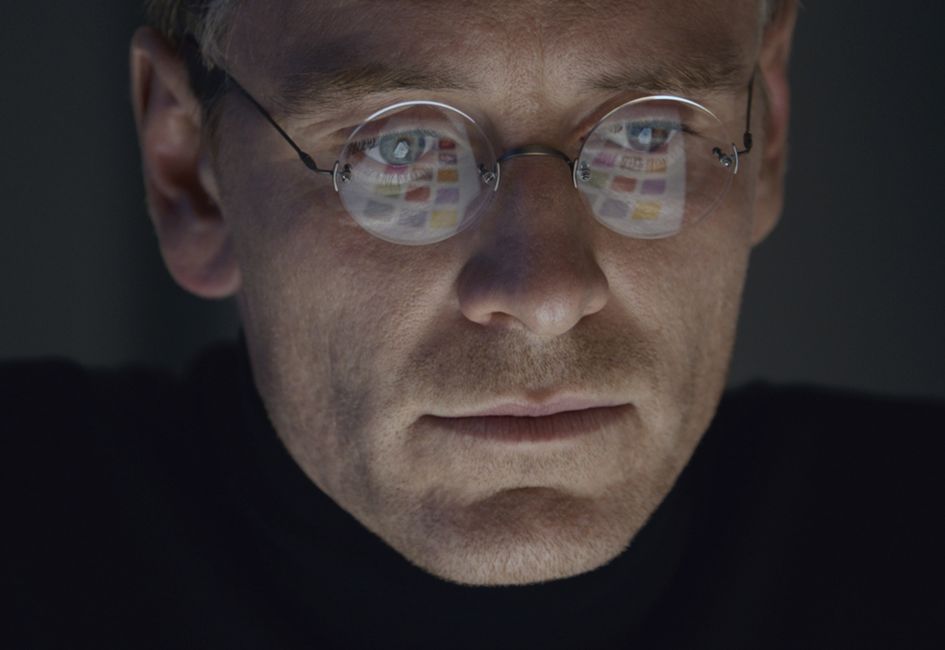As a piece of history, Steve Jobs is not perfect.
The new film directed by Danny Boyle from a script by Aaron Sorkin takes many liberties with Jobs, as people who covered him and knew him personally have pointed out in the lead-up to the release of this movie.
So this not a literal re-telling of the life of the iconic former head of Apple, who passed away in 2012 from pancreatic cancer. Rather, it is a film that gives you the essence of who Jobs was while also doubling as a fine piece of filmmaking and an entertaining way to spend two hours.
Jobs was known for his tightly-produced product launches. He created a new phenomenon—the product launch that also serves as an entertainment event—and this film centers wholly around three of those moments, each broken down into 40 minute chapters: the Macintosh, NeXT and iMac personal computers. Prior to each of those launches, the movie takes you backstage into fictional conversations between Jobs and those around him that slowly reveal who he really was: an arrogant, egomaniacal, perfectionist jerk who was also one of the greatest creators and showmen in history.
Make no mistake about it: the Jobs you will discover in this movie is close to the real thing, even if the conversations created by Sorkin are pure fiction. Played to perfection by Michael Fassbender, you will at once loath and love this film version of Steve Jobs, far more than you probably did when Ashton Kutcher took on the role.
You will learn what made him tick, and you'll see his legendary disdain for the opinions of others. Jobs believed he knew what the public wanted before they even knew how to ask for it; given that he completely reinvented the personal computer, the music player, the phone and the tablet computing experience, it's difficult to claim that he was wrong.
But there is far more to Jobs than what he did for Apple, and Boyle, Sorkin and Fassbender bring it to life. From his strange denial of his daughter in her early years to his combative relationship with nearly everyone around him, Jobs was far from perfect, even though he demanded perfection from others.
Sorkin, known for his buzzing scripts and feverish dialogue, reveals these insights into Jobs' psyche through his conversations with others during the moments leading up to his product launches. When Jobs is preparing to launch the Macintosh (with just 40 minutes to go before the audience streams into the auditorium), he belittles an engineer who can't make the Mac say "hello" upon being turned on. The engineer says that it's impossible, but Jobs refuses to accept that for an answer.
He also wants the arena completely blacked out for his presentation, a thing made impossible by the red exit signs throughout the building. Jobs wants them turned off, and he is told no, that it's against the law. Jobs says he'll pay the fine, and that if the building catches on fire, the people who are in the building will have been able to see a momentous, history-altering event (the launch of the Macintosh) before they die a fiery death.
To this version of Jobs, this seems like a good trade-off. Nothing can stand in the way of a perfect launch.
There are many such moments throughout all three acts of this film, and all of them build towards a sastisying conclusion. It's hard to explain how thrilling this was to watch. This is a movie that clocks in at two hours, but feels much shorter.
You'll leave with conflicted feelings about Jobs, but that is natural given that the people closest to him seem to feel the same way about the real man.
Even if much of it is fiction, Steve Jobs is a highly entertaining movie, perhaps more so than it has any right to be. It will no doubt receive consideration when awards season rolls around, and rightly so. It's a must-see, even if you aren't an Apple fanboy.
Rating: 9 out of 10

What do you think?